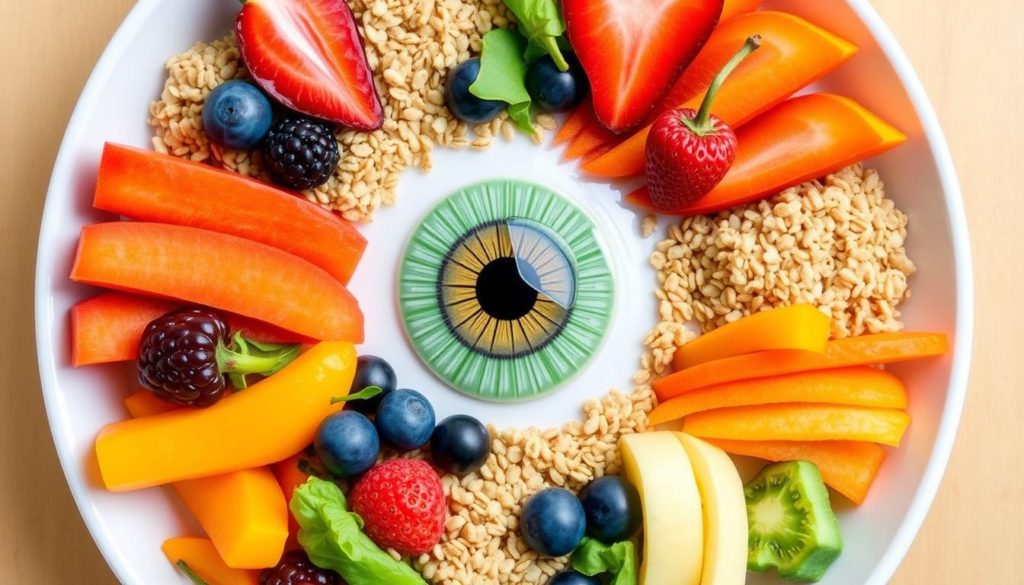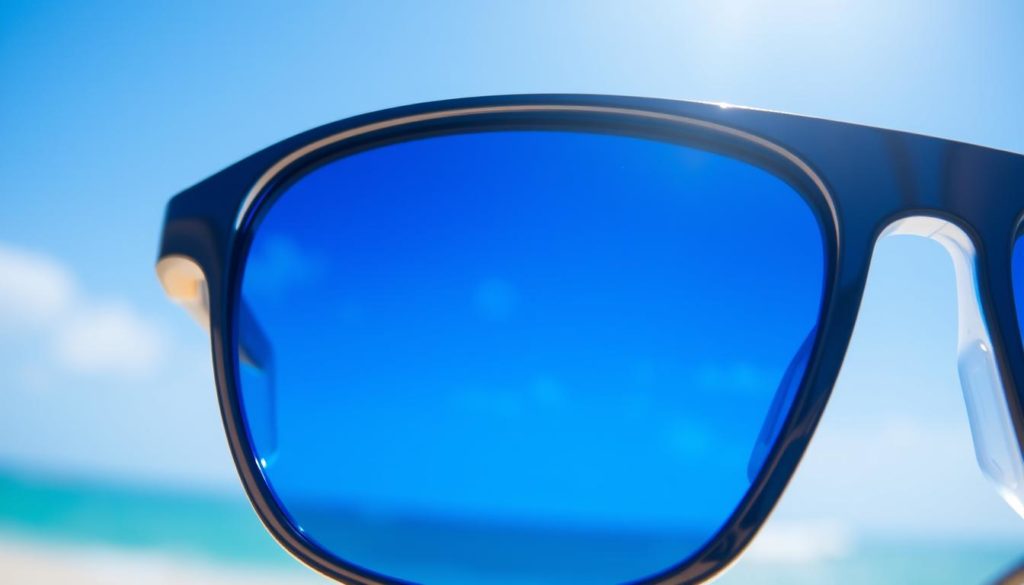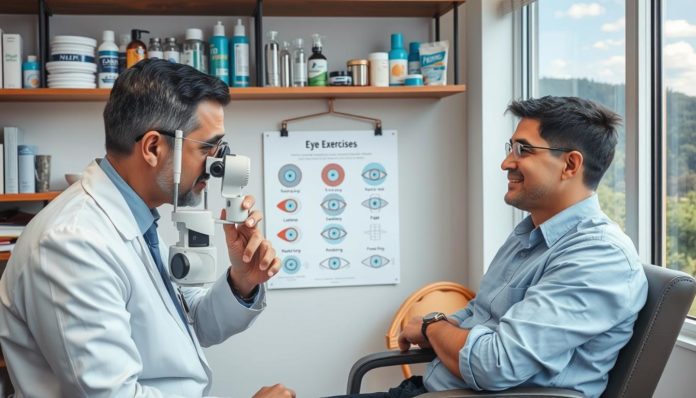Did you know that nearly 80% of vision impairment worldwide is avoidable? Taking care of your eyes is more than just seeing clearly. It’s about making choices that keep your eyes healthy.
Good eyesight is not just about regular check-ups. It’s about eating right, wearing safety gear, and watching for any eye changes. These steps are key to protecting your vision.
Follow these eye health tips to keep your vision sharp. By doing so, you can prevent eye problems before they start. Your eyes are precious. Give them the care they need.
Importance of a Balanced Diet for Eye Health
Eating a diet full of important nutrients can make your eyes healthier. Vitamins and minerals boost your daily vision and help prevent eye diseases. Adding certain foods to your meals helps your eyes work their best.

Best Foods for Eye Health
It’s key to eat a variety of foods rich in nutrients for eye health. Some top foods for your eyes include:
- Green leafy vegetables like spinach, kale, and collards are full of lutein and zeaxanthin. These help prevent eye diseases.
- Fatty fish such as salmon, tuna, and trout are packed with omega-3 fatty acids. These are good for the health of the retina.
- Citrus fruits, especially oranges, give you a lot of vitamin C. This vitamin is key in stopping age-related macular degeneration.
- Nuts and legumes, like almonds and sunflower seeds, have vitamin E. This is another important antioxidant for your eyes.
- Eggs are full of nutrients good for your eyes, including lutein, vitamin A, and zinc.
These foods protect against oxidative stress and keep healthy eye tissue.
Role of Nutrients in Preventing Eye Diseases
It’s vital to know how nutrients help prevent eye diseases like cataracts and macular degeneration. Vitamins C and E, along with zinc and omega-3 fatty acids, protect the eyes from free radicals. Eating these nutrients often helps keep your eyes strong and healthy.
Following these eye health tips makes sure your diet helps your vision in the long run. It reduces oxidative damage and strengthens eye tissues against future problems.
Wear Sunglasses for UV Protection
Wearing sunglasses is more than just a fashion statement. It’s a key way to protect your eyes from harmful UV rays. By wearing sunglasses often, you can lower the risk of serious eye problems.
Choosing the Right Sunglasses
When picking sunglasses for UV protection, make sure they block 99% to 100% of UVA and UVB rays. Look for wraparound lenses for better coverage and less eye strain. Some contact lenses also offer UV protection, giving you an extra layer of safety.

Benefits of UV Protection
UV protection does more than prevent sunburn. It helps keep your eyes healthy by reducing the risk of cataracts and macular degeneration. Wearing sunglasses helps maintain your vision and keeps your eyes sharp and clear.
| Feature | Benefit |
|---|---|
| UV 100% Protection | Prevents cataracts and macular degeneration |
| Wraparound Lenses | Reduces peripheral UV exposure |
| UV Protective Contacts | Additional layer of UV defense |
Preventative Eye Care Techniques
Preventative eye care is key to keeping your vision sharp and your eyes healthy. It means doing regular things and taking steps to spot and fix problems early.
Regular Eye Exams
Getting regular eye exams is crucial for catching any hidden issues early. Visiting an optometrist or ophthalmologist regularly can spot problems like glaucoma before they show symptoms. These exams also make sure your glasses or contacts are correct, meeting your eye health needs well.
Signs You Need an Eye Check-Up
Knowing when you need a vision check-up is important for quick action. If your vision changes suddenly, you feel eye pain, or you have eye strain that won’t go away, it’s time to get checked. Taking care of these eye health needs quickly stops more problems and keeps your vision clear.
The Link Between Obesity and Eye Health
It’s important to know how obesity affects eye health. Being overweight can lead to vision issues. Conditions like type 2 diabetes, a top cause of blindness, are more common in obese people. Keeping a healthy weight can lower these risks.
How Obesity Affects Vision
Carrying extra weight can cause vision problems, like cataracts and damage to the optic nerve. This happens because being overweight often means higher blood sugar levels. This increases the chance of diabetes and blindness. Keeping a healthy weight helps reduce these risks.
Prevention Strategies
Preventing obesity and eye problems is key. Here are some ways to do it:
- Eat a balanced diet full of nutrients good for your eyes.
- Stay active to keep your weight in check and lower diabetes and blindness risks.
- Get regular eye check-ups to catch problems early.
- Keep an eye on your blood sugar to prevent diabetes-related vision issues.
Using these prevention methods and making healthy choices is vital for your weight and eye health. By being informed and proactive, you can greatly reduce the risk of vision problems from obesity. This helps keep your eyes healthy for life.
| Factors | Impact on Eye Health |
|---|---|
| Obesity | Increased risk of cataracts and optic nerve damage |
| Diabetes | Lead cause of adult blindness |
| Managing Body Weight | Helps reduce risk of vision problems and diabetes |
Essential Eye Health Maintenance Practices
Adding eye health habits to your daily life can greatly help your vision in the long run. Start by eating foods full of omega-3 fatty acids, lutein, zinc, and vitamins C and E. Think about eating spinach, fish, nuts, and citrus fruits to boost your eye health. For more tips on keeping your eyes healthy, check out ocular health management.
Wearing sunglasses that block UVA and UVB rays is also key for eye health. Not protecting your eyes from the sun can lead to serious problems like cataracts and macular degeneration. Choose sunglasses that offer good protection to keep your eyes safe.
Being active also helps your overall health and supports your eyes. A life spent sitting too much can harm your eyes due to poor blood flow and diabetes. Diabetes is linked to eye problems like diabetic retinopathy.
Eye strain from looking at screens for too long is a big issue. Following the 20-20-20 rule—taking a 20-second break to look at something 20 feet away every 20 minutes—can help prevent eye strain. Make sure your workspace is set up to be good for your eyes too.
Regular eye exams are vital for keeping your eyes healthy. Whether you see an ophthalmologist or an optometrist, these exams help catch and fix eye problems early.
- A balanced diet with key nutrients
- UV-blocking sunglasses
- Regular physical activity
- Screen time management
- Routine eye check-ups
Protective Eye Gear for Sports and Work
Playing sports and working in certain jobs can be risky for your eyes. Wearing the right eye safety gear helps lower injury risks. It also protects you from dangers.
Types of Protective Gear
There are different eye safety gear options for various activities:
- Helmets with face masks: Perfect for sports like hockey and football.
- Polycarbonate sports goggles: Great for basketball and racquet sports.
- Safety glasses with side shields: Often needed in industrial and construction jobs.
When to Use Eye Protection
It’s important to know when to wear eye safety gear to avoid injuries. Here are some guidelines:
- During High-Impact Sports: Always use goggles or helmets to protect your eyes from hits.
- In Hazard-Prone Work Environments: Wear eye protection when dealing with machinery, chemicals, or heavy items.
Using eye safety gear wisely keeps your vision safe and healthy. It helps protect you in sports and work.
Effects of Smoking on Vision
Smoking harms many parts of the body, including the eyes. It’s important to know how smoking affects vision and eye health. This knowledge helps keep your eyes healthy.
Why Smoking is Harmful
Smoking raises the risk of age-related macular degeneration and other eye problems. Cigarettes have harmful chemicals that cause stress and inflammation in the eyes. This can lead to macular degeneration, cataracts, and diabetic retinopathy.
Stopping smoking is key to lowering these risks.
Ways to Quit Smoking
Quitting smoking can improve your eye health. Here are some ways to help you:
- Get advice and support from healthcare professionals.
- Join support groups and counseling sessions.
- Try nicotine replacement therapies like patches or gum.
- Stay active and find ways to manage stress.
- Eat healthier to fight cravings and get the nutrients you need.
Using these strategies can help you quit smoking. It also lowers the risk of vision problems from smoking. This means better eye health and overall well-being.
Tips for Reducing Digital Eye Strain
In today’s digital world, it’s key to reduce eye strain for those on screens a lot. Simple habits can make a big difference in eye health and comfort. Here are top tips for digital eye strain prevention.
Adjusting Screen Settings
Getting your screen settings right is key to preventing digital eye strain. Make sure your screen’s brightness matches the room’s light to cut down on glare. Adjusting the text size and contrast helps with reading comfort and eye fatigue. Also, place your screen to keep your head and neck comfy. This ergonomic screen positioning lowers the risk of eye problems over time.
The 20-20-20 Rule
The 20-20-20 rule is a great way to fight eye fatigue. It means taking a 20-second break every 20 minutes to look at something 20 feet away. This break helps your eyes relax and eases strain from screens. Adding this to your day can be a powerful eye fatigue remedy. Doing the 20-20-20 rule often keeps your eyes healthy with more screen time.
Role of Exercise in Vision Protection
Physical activity is key to eye health. Regular exercise boosts overall health and keeps vision sharp. It ensures good blood flow to the eyes, which is crucial for their function and helps lower eye pressure.
Being active does more than just help the body. It also protects the eyes in many ways. Exercise can prevent eye problems by managing health issues like diabetes and high blood pressure. By staying fit, people can lower the risk of eye diseases such as glaucoma and macular degeneration.
Exercise also boosts overall health in many ways. It improves mood, energy, and stress management, which helps keep the eyes healthy. By making exercise a part of daily life, people can keep their bodies and eyes in top shape. This shows how important exercise is for keeping eyes healthy for life.
FAQ
What are the essential tips for eye health maintenance?
Good eye health comes from a mix of diet, protective gear, and eye exams. Eating foods rich in nutrients, staying active, and resting your eyes helps. These steps protect your vision and keep your eyes healthy.
What are the best foods for eye health?
Foods high in omega-3, lutein, zinc, and vitamins C and E are great for your eyes. Include green leafy veggies, oranges, salmon, tuna, nuts, and eggs in your meals. These foods help prevent eye problems like macular degeneration and cataracts.
How do nutrients help in preventing eye diseases?
Nutrients like omega-3, lutein, and vitamins C and E fight oxidative stress and keep eye tissue healthy. They help prevent age-related eye issues, supporting your eye health for the long term.
How important are sunglasses for UV protection?
Sunglasses are key for shielding your eyes from UVA and UVB rays. Look for ones that block 99% to 100% of these rays to prevent eye diseases. Wraparound lenses and UV-protective contacts offer extra protection.
How do I choose the right sunglasses for UV protection?
Choose sunglasses with 99% to 100% UV protection for UVA and UVB rays. Wraparound lenses are better because they block rays from the sides. Some contact lenses also protect against UV rays.
Why are regular eye exams important?
Regular eye exams catch eye problems early, like glaucoma. Keeping up with your glasses or contacts and noticing vision changes helps. This is key to preventing vision loss and keeping your eyes healthy.
What signs indicate the need for an eye check-up?
If your vision changes suddenly, you feel eye discomfort, or you have eye strain, get an eye exam. Regular check-ups catch problems early and keep your eyes healthy.
How does obesity affect vision?
Being overweight raises the risk of diabetes, a top cause of blindness. It also increases the chance of cataracts and optic nerve damage. Eating right and exercising can lower these risks and help your vision.
What are some prevention strategies for obesity-related vision problems?
Eat a balanced diet and exercise regularly. These actions help control your weight, lower the risk of type 2 diabetes, and prevent vision issues.
What daily practices contribute to eye health maintenance?
Eating well, exercising, and taking screen breaks are key. These habits support your eye health and prevent common eye problems, ensuring you keep seeing well.
What types of protective eye gear are recommended for sports and work?
For sports and work, use helmets with face masks or polycarbonate goggles. The right gear reduces the risk of eye injuries during these activities.
When should I use eye protection?
Use eye protection during risky activities like sports and certain jobs. It’s crucial for preventing injuries and keeping your eyes safe in different situations.
How does smoking affect vision?
Smoking ups the risk of age-related macular degeneration and other eye issues. Knowing the dangers of smoking on your eyes and quitting can help keep your vision clear.
What are some effective ways to quit smoking for better eye health?
To quit smoking, join support groups, try nicotine replacement therapy, and live healthier. Quitting lowers the risk of vision problems linked to smoking.
What adjustments can help reduce digital eye strain?
Adjust your screen settings to cut glare and use an ergonomic setup. Following the 20-20-20 rule—looking at something 20 feet away for 20 seconds every 20 minutes—also helps prevent eye strain.
How does exercise contribute to eye health?
Exercise boosts blood flow, which is good for the retina and lowers eye pressure. It can slow down age-related eye problems and improve vision, supporting your eye health.


